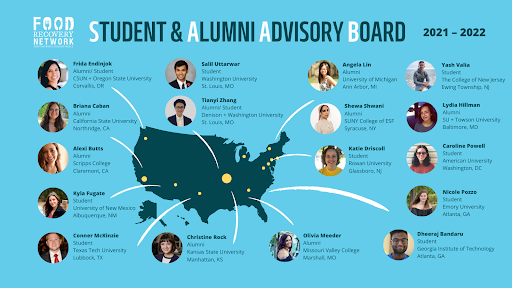Last week, FRN’s Student and Alumni Advisory Board (SAAB) hosted a series of Instagram Lives to share their experiences, key learnings, challenges and successes, and more. In case you missed it, here were the key takeaways that I, Cassie, Manager of Stakeholder Engagement here at FRN National, gathered from these fruitful conversations.
Spill the Beans: Problem Solving During Food Recoveries
Speakers: Alexi Butts, Conner McKinzie, and Salil Uttarwar
Communication is key when it comes to having a successful food recovery. Make sure to have regular, consistent communication with your food donors, partner agencies, and volunteers to ensure all are aligned on roles and responsibilities, timing, and expectations.
Backup plans are your best friend. Whether it be working with multiple partner agencies that can accept your recovered food, branching out to work with off-campus food donors for more food recovery opportunities, or having on-call alternate volunteers, backup plans are the way to go.
Bring it back to the “why”. Our mission is to fight food waste and feed people — remind your volunteers at the start of food recoveries, share it with dining staff, shout it from the rooftops if you have to! You and your chapter are making an impact in your community and on our planet, and that is what matters most. And hey, you/your peers might like this work more than you ever could have imagined.
I Can’t Believe We Did That! Starting an FRN Chapter during COVID
Speakers: Caroline Powell and Dheeraj Bandaru
FRN does more than just food recovery. We raise education and awareness on key issues of hunger and sustainability. We advocate for legislation that supports our efforts to mitigate climate change and end hunger. There are many ways to get involved beyond recovering and donating surplus food.
Having a network of peers and partners committed to this work helps… A LOT. We have resources to support our network of student leaders, we hold regular chapter calls and conversations to encourage one another in this work, and we are here to support you and your efforts to help your local community.
Repeat after me: people power, People Power, PEOPLE POWER. Now, more than ever, people are committed to addressing the imminent effects of climate change and ensuring all people have access to healthy, nutritious food. Seek out like minded people to help you on your journey to starting a chapter, mitigating waste, and routing food to communities in need. (And don’t forget to thank those people along the way!)
Beyond the Campus: Create Lasting Community Relationships
Speakers: Shewa Shwani and Christine Rock
Ask how else you can support your partners. Maybe your partner agency is in need of clothing donations, or volunteering, or fundraising. Ask how you and your chapter can support their efforts in the community beyond recovered food donations. And work to continue these efforts in your own community post-graduation.
Play that back again: Communication is key. Have regular conversations and roundtable discussions with your key partners (food donors, partner agencies, volunteers, etc) to ensure all are aligned on the goals of the partnership and are actively working to support such goals.
Participating in FRN may be teaching you more about the working world than you realize. Collaborating and leading a team, problem solving, project management, logistics, the list goes on. In working with FRN, you will gather valuable skills that can support you throughout your time in college and beyond. Make sure to first pat yourself on the back for those skills and lessons learned, and then add it to your resume
What a wealth of knowledge these leaders have! If you are interested to learn more about SAAB and ways to get more involved with FRN on the national level, contact our team at saab@foodrecoverynetwork.org.












